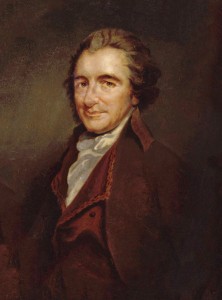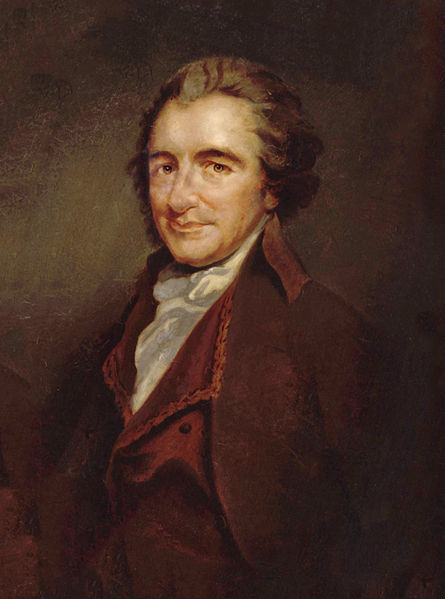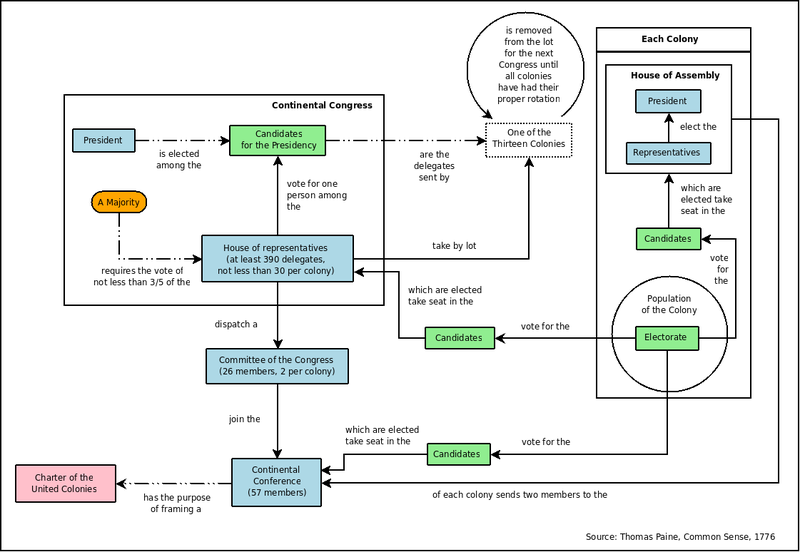
Progressives looking for American roots for their ideals might shun the Revolutionary Period, instead drawing upon the Populist and Progressive Eras and the New Deal for inspiration. However, this a relatively shallow reading of the nation’s history, and one that plays into the hands of modern conservatives, who seek to present progressivism as an aberration hatched almost entirely in the mind of Karl Marx.
As I showed in Part 1, progressive ideals have been around at both the foundation of democracy in English and at the foundation of capitalism. Certainly, so have other tendencies, but these are the roots, and mighty trees have many roots.
At about the same time Adam Smith was publishing The Wealth of Nations, his fellow Englishman Thomas Paine was publishing Common Sense. Lately, this pamphlet has been picked up by Glenn Beck and other such folks, claiming that in it, Paine acknowledges all of their complaints with the federal government and would completely support them. Unlikely. Paine was a radical democrat, who was the odd-man out among the Founding Fathers. Virtually alone among them, Paine said that the average person should be allowed to vote; and thus Common Sense, with such calls for universal (white) male enfranchisement, was a powerful tool to rally Americans to the cause of what were mostly well-to-do men who had no intention of allowing them to vote. Modern-day conservatives, some of whom are calling for instituting property requirements and the return of indirect election of Senators, would be hard-pressed to find support from Paine.
Paine was beyond even the mere enfranchisement of citizens though. Below, from Paine’s Agrarian Justice:
[21] Having thus in a few words, opened the merits of the case, I shall now proceed to the plan I have to propose, which is,
[22] To create a national fund, out of which there shall be paid to every person, when arrived at the age of twenty-one years, the sum of fifteen pounds sterling, as a compensation in part, for the loss of his or her natural inheritance, by the introduction of the system of landed property:
[23] And also, the sum of ten pounds per annum, during life, to every person now living, of the age of fifty years, and to all others as they shall arrive at that age.
–Thomas Paine, Agrarian Justice
Paine regarded property rights as impermanent. Paine also utilized the second suggestion in Rights of Man. He also suggested this before discussing those in old age (for the time):
…pay as a remission of taxes to every poor family, out of the surplus taxes, and in room of poor-rates, four pounds a year for every child under fourteen years of age; enjoining the parents of such children to send them to school, to learn reading, writing, and common arithmetic…
By adopting this method, not only the poverty of the parents will be relieved, but ignorance will be banished from the rising generation, and the number of poor will hereafter become less, because their abilities, by the aid of education, will be greater. Many a youth, with good natural genius, who is apprenticed to a mechanical trade, such as a carpenter, joiner, millwright, shipwright, blacksmith, etc., is prevented getting forward the whole of his life from the want of a little common education when a boy.
–Thomas Paine, Rights of Man
Paine was severely different from the rest of the Founders, but because of the relatively shallow reading of history we presume that all founders were monolithic in their ideals and reasons (though they were mostly drawn from a rich merchant class). Thus, in our reading of history, we go Revolution-Article of Confederation Period-Constitution. We get the briefest mentions of Shays’ and the Whiskey Rebellions, and then briefly glance over the anonymous Anti-Federalists. Sometimes, we don’t even pause on the years between the end of the Revolution and the beginning of the Philadelphia Convention, almost as though the Founders immediately sat down to write the Constitution right after they signed the Treaty of Paris. John Adams’ view of Common Sense? “A poor, ignorant, malicious, short-sighted, crapulous mass.”
To get a sense of how different Paine’s view of government was, here’s his version of how the country should’ve been arranged from Common Sense (Paine also called for the direct election of justices, but that’s not visible):
I think some of it is really quite confusing, and not everything I like. None it of it was considered at Philadelphia. In contrast, here’s James Madison’s Virginia Plan:
Which gets me on to Madison. Lately picked up as a hero of the right, Madison is perhaps famous as a man who advocated against the excesses of government. The Federalist Papers; published by Madison, Alexander Hamilton, and John Jay; have become useful tools for the right in their arguments for states’ rights and limited federal government. If you’re looking at the Virginia Plan above, maybe something leaps out at you right away which might seem to contradict it. If you can’t spot it, I’ll point it out: Madison advocated for federal veto powers over state laws. That should be enough to strike him from the hearts of any states’ righter.
That the Federalist Papers are even utilized by the right is an interesting feat of intellectual blindness. Considering that 51 of them were written by Alexander Hamilton, versus 26 for Madison and just five by Jay, one wonders why those looking for limited federal government are using arguments advanced by the strongest proponent of centralized government in the fledgling republic. Perhaps, because the Federal Papers are intended to convince the Anti-Federalists that the changes wrought by Madison’s beloved commerce clause and the new Constitution are not really the radical changes from the Articles of Confederation that they actually were.
It’s difficult for any movement to align itself with folks like the Anti-Federalists; though I don’t think it’s impossible. But it’s clear to me that the Founders largely ignored the ideals that Paine used to inspire the masses to revolution in favor an exclusive form of republican democracy. The Founders that stand greatest in our minds today were all flawed individuals; largely because they were humans, not gods; despite their virtual ascension to such status. Those that are forgotten generally lacked good P.R. people.
But the most forgotten in the early republic are the most interesting. I intended this part to end my writing, but given the current length, I’ll stop here and return to the rebellions in the next part.




Deprecated: Function get_magic_quotes_gpc() is deprecated in /hermes/bosnacweb08/bosnacweb08bf/b1577/ipg.rifuturecom/RIFutureNew/wp-includes/formatting.php on line 4387
Deprecated: Function get_magic_quotes_gpc() is deprecated in /hermes/bosnacweb08/bosnacweb08bf/b1577/ipg.rifuturecom/RIFutureNew/wp-includes/formatting.php on line 4387
Deprecated: Function get_magic_quotes_gpc() is deprecated in /hermes/bosnacweb08/bosnacweb08bf/b1577/ipg.rifuturecom/RIFutureNew/wp-includes/formatting.php on line 4387